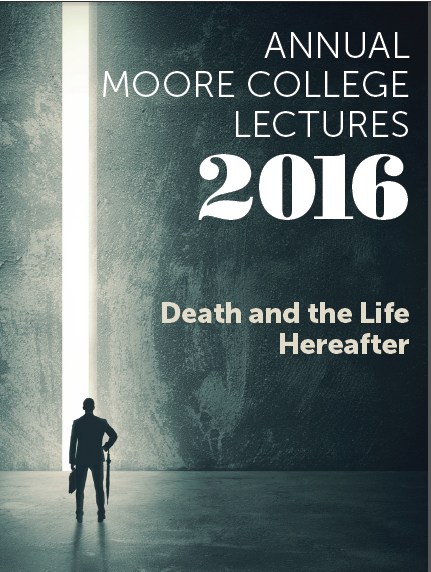In the first lecture of the Annual Moore College Lectures Dr Paul Williamson briefly summarised Evangelical Universalism and said that, “a gauntlet has been thrown down”. His last lecture critiques six of Parry’s arguments.
1. Salvation Through Judgment
The overall trajectory of Revelation, like the Bible as a whole, is salvation through judgment. That is to say, judgment is not, and never is, God’s final word.
Parry’s argument according to Williamson, Heaven, the Ultimate Destination? (1h 12m 27s)
We can certainly concede that the overall trajectory of Scripture is indeed salvation through judgment—after all, this is ultimately expressed in the atoning death of the Lord Jesus, which saves us from God’s coming wrath. However, such salvation does not apply to those who end up paying the penalty for sin themselves. Either Jesus pays for our sin or we do. Thus it’s simply misleading to suggest that judgment is never God’s final word for those who die in their sin—this is indeed the case, whether in the Old Testament or in the New.
Williamson’s response to 1., Heaven, the Ultimate Destination? (1h 15m)
Given the numerous biblical examples of the judgment→salvation pattern 1 in this age (e.g. Noah, David, Jonah, Israel), it’s not surprising we agree that “the overall trajectory of Scripture is indeed salvation through judgment”. But the question is:
Does that pattern stop on Judgment Day??
The examples in this age alone set a significant precedent but there’s more. I think there are even some examples where the salvation occurs in the age to come. For example, Sodom and Gomorrah experienced “the punishment of aionios [age to come] fire” (Jude 1:7), so their promised restoration (Ezek 16:53) must also be in the age to come. If Judgment Day is the start of the age to come, another example would be the man handed over Satan so “he himself will be saved on the day the Lord returns.” (1Cor 5:5) The Apostle Paul explains that:
A partial hardening [being cut off for awhile] has come to Israel until the full number of the Gentiles has come in [so that] all Israel will be saved
Romans 11:25b-26a, HCSB
As far as I know, Gentiles will be coming in all through this age, so Israel’s salvation must be after that, sometime in the age to come 2.
Another example might be those who responded to Jesus preaching the gospel when “He descended into hell” (Apostles’ creed)—possibly those who died “in the days of Noah” (1 Peter 3:18).
… the gospel was preached even to those who are dead, that though judged in the flesh the way people are, they might live in the spirit the way God does.
1 Peter 4:6, ESV
I don’t know if this counts but it’s interesting that Moses didn’t reach the Promised Land in this age because he was punished but he did in the age to come (Matt 17:3).
Does God’s wrath rule out subsequent mercy? No. The world already experiences God’s wrath (Rom 1:18), and yet every day people are saved.
Does people’s penalty-paying 3 permanently exclude them from atonement? Again, I think not. There’s a lot of overlap between punishment, wrath, and penalty-paying, so the above examples may already suffice. However, it’s worth considering a penalty of sin that everyone receives—death.
For as in Adam all die
1 Corinthians 15:22a, HCSB
Adam’s sin brought death, so death spread to everyone, for everyone sinned.
Romans 5:12b (cf v17, 21), NLT
Everyone has died spiritually (Eph 2:1, Col 2:13, and the above), and even people who haven’t died physically, experience it through sickness, aging, etc. and the sorrow of a loved one dying.
Despite each person paying that penalty themselves, Christians still believe Christ saves at least the Elect. That someone has already served part of their life sentence, doesn’t stop a king pardoning the remainder (even if that remainder is infinite).
Or from a different angle, that a Christian experiences God’s discipline (which sometimes includes a period of penalty-paying), doesn’t mean they’ve voided Christ’s atonement for them.
So to summarise, I don’t see—in this age or the next—punishment, penalty-paying, or wrath, ruling out a subsequent turning to Christ (indeed it seems to often provoke it). Therefore, I can trust that God will use His atonement, ransom, and death for everyone (as the passages below reveal). Ultimately, nothing, even humanity’s abhorrent rebellion, can diminish the boundless effectiveness of the Cross.
And Christ himself is the means by which our sins are forgiven [atoned], and not our sins only, but also the sins of everyone.
1 John 2:2, GNT
He gave himself as a ransom for everyone, the testimony at the proper time.
1 Timothy 2:6, ISV
Christ’s love controls us. We are sure that one person died for everyone. And so everyone died.
2 Corinthians 5:14, NIRV

1. There’s often a warning beforehand, and also punishment, repentance, faith, etc. before the salvation.
2. Exactly when in the age to come is hard to say. It depends on whether or not the ‘full number’ means all the Gentiles, and on whether the redeemer coming from Zion is a reference to the Second Coming (Parry’s suggestion).
3. I say “penalty-paying” as I believe the paying is ongoing as we accrue debt to God much faster than we are able to pay.

